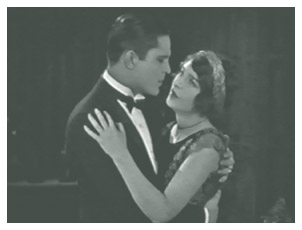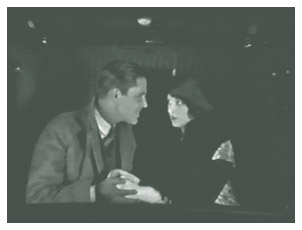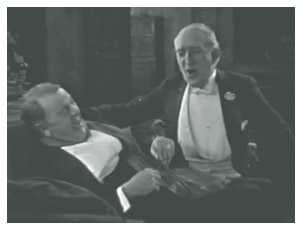

Produced by MGM
Directed by Frank Borzage
Cast: Eleanor Boardman (Elizabeth), Malcolm McGregor (Edward "Teddy"
Luton), Alec B. Francis (Lord Clive Cheney), Eugenie Besserer
(Lady Catherine), George Fawcett (Lord "Hugh" Portenous),
Creighton hale (Arnold Cheney), Otto Hoffman (Dorker), Eulalie
Jensen (Mrs. Shenstone)
W. Somerset Maugham's play "The Circle: A Comedy in Three Acts" was written in 1919 and first produced for the stage in 1921 with great success. It has stood the test of time, having been performed regularly over the past 90+ years, most recently (at the time of this writing) at the Westport Country Theatre in Westport, Connecticut, with Marsha Mason in the role of Lady Catherine. In 1998, it was named among the 100 most significant plays of the 20th century.
Yet it is safe to say that only the
most "literary" of us may have even heard of Maugham's
play. Silent movie fans, in particular, are far more familiar
with Maugham as the author of Glor ia Swanson's
1928 hit "Sadie Thompson" (nee, "Miss Sadie Thompson).
"The Circle" certainly doesn't carry the emotional "punch"
of "Sadie Thompson," yet it does wear well as what it
was intended to be - a comedy of manners, with enticing infidelity
underlying its message, and spiced with a tasty dashes of questionable
morals, love triangles and the risks of true love.
ia Swanson's
1928 hit "Sadie Thompson" (nee, "Miss Sadie Thompson).
"The Circle" certainly doesn't carry the emotional "punch"
of "Sadie Thompson," yet it does wear well as what it
was intended to be - a comedy of manners, with enticing infidelity
underlying its message, and spiced with a tasty dashes of questionable
morals, love triangles and the risks of true love.
MGM and Borzage have been criticized for altering the ending of Maugham's original story for the 1925 screen version - the viewer will have to determine that after seeing the film - however, the characterizations, which are the foundation of the story, bubble amusingly in this screen version - and why not with such a quality cast as Eleanor Boardman, Creighton Hale, Alec Francis, George Fawcett, Eugenie Besserer (who steals the show!), and Malcolm McGregor?
The play's titles comes from the fact that father and son experience the same fate - their wives fall in love with a best friend. It happened to the father, Lord Cheney, 30 years earlier when Lady Catherine ran off with Cheney's best man from the wedding, Hugh Portenous. In the present (1925 in this film), Cheney's son, Arnold, is married to Elizabeth. However, Elizabeth has fallen in love with Teddy and plans to run off with him. Will the "circle" be broken, or will history repeat itself?
Here's where the fun comes in. Lord Cheney has not seen his wife or the scoundrel who stole her in 30 years. However, Elizabeth has invited Lord Portenous and Lady Catherine to come visit and see the son she hasn't seen in 30 years. Keep in mind, Arnold and Elizabeth live in the family home with Lord Cheney - and until just before the wayward couple arrive at the home, Cheney has no idea they are coming! How will he react to Lord Portenous and Lady Catherine coming into his home? Violently? Forgiving? The tension is delightful!
So, why did Elizabeth decide to do this? Arnold certainly wasn't in favor of the idea, and Elizabeth was sure she had arranged this while Lord Cheney was away in London. As we watch Elizabeth and Teddy sneak a brief rendezvous when no one's around, we learn what's behind this visit. "Why are you having them come here . . . to bring the past to life?" Teddy asks. She answers, "I'm curious to see them . . . to know if it has paid."
When the blustery Portenous and ditzy Lady Catherine arrive, Elizabeth is wide-eyed and open-mouthed. Neither even remotely resembles the handsome young couple we saw at the beginning of the movie - or the photos Elizabeth has seen from 30 years earlier. Portenous scowls and complains constantly. The frumpy, and somewhat overly dressed and made up Lady Catherine is almost the polar opposite - giddy, talkative, embracing everyone - including ex-husband Lord Cheney. Lady Catherine's character is the best of the bunch, and Eugenie Besserer makes full use of this opportunity to shine. She whirls in the room, raising her lorgnette up to see better, and announces, "Arnold, my son! I should have known you anywhere!" and goes straight to Teddy while the incredulous Arnold stares stonefaced at this unconventional woman. Lady Catherine's lines are sterling, as well. She raises the lorgnette once more to better see Lord Cheney - then, suddenly realizing who he is, she exclaims, "It's he! My original husband!" She rushes over to him, taking hold of his arm and nuzzling close. "What a moment for you, Clive! You are overjoyed to see me, aren't you? Kiss me, Clive!"
However, Eleanor Boardman is the star
of this film and her character, Elizabeth, is at the center of
our tale. Famed critic DeWitt Bodeen once said of Boardman, "
. . . she stands out unforgettably as a sympathetic player, well-bred,
tastefully gowned, lovely to look at, and always an actress far
better than most of the material in which she was featured."
(1) Certainly,  "The Circle"
is made better by her appearance in it, and she is, as always,
"lovely to look at." Although she came to Hollywood
in 1922 with only a minimal theatrical background, Boardman is
one of the best actresses of the silent screen - a reputation
that could stand alone with her performance in King Vidor's "The
Crowd"(1928). The nuances of expression, the economy of gestures,
the ability to articulate with her eyes, are skills that served
her well throughout her acting career, as well as in "The
Circle." For example, she has invited Portenous and Catherine
at a time when she believes Cheney to be in London. However, only
minutes before they are to arrive, Cheney walks in the room -
which is already electric with nervousness - with his shotgun
in hand announcing, "Never felt so keen on shooting in my
life as I do today!" Boardman doesn't drop her jaw. She doesn't
place her hand at her mouth. She simply stares - eyes fixed and
unflinching as if mesmerized by a haunting vision - and conveys
both shock and extreme trepidation with that one expression.
"The Circle"
is made better by her appearance in it, and she is, as always,
"lovely to look at." Although she came to Hollywood
in 1922 with only a minimal theatrical background, Boardman is
one of the best actresses of the silent screen - a reputation
that could stand alone with her performance in King Vidor's "The
Crowd"(1928). The nuances of expression, the economy of gestures,
the ability to articulate with her eyes, are skills that served
her well throughout her acting career, as well as in "The
Circle." For example, she has invited Portenous and Catherine
at a time when she believes Cheney to be in London. However, only
minutes before they are to arrive, Cheney walks in the room -
which is already electric with nervousness - with his shotgun
in hand announcing, "Never felt so keen on shooting in my
life as I do today!" Boardman doesn't drop her jaw. She doesn't
place her hand at her mouth. She simply stares - eyes fixed and
unflinching as if mesmerized by a haunting vision - and conveys
both shock and extreme trepidation with that one expression.
To quote another instance of Boardman's superb, retrained acting - and without giving away the ending - Arnold finally, toward the end of the story, does something assertive and manly. As a result, he orders Elizabeth to her room. Elizabeth (Boardman) looks at him in disbelief and fear, afraid to take her eyes off this man who is suddenly unfamiliar to her - obviously fearful of what he may do next - all the while moving ever so slightly to his command, defensively, on her guard.
Her moments with McGregor are loving and charming - she runs her hand ever so gently under his cheek, looks longingly and lovingly into his eyes - the attraction she feels for Teddy is evident - and she adds a sexiness to the role that makes it easy for us to see why Teddy is attracted to her.
One of her best scenes is with Alec Francis as Lord Cheney. After the initial shock that he has not gone to London, Elizabeth finds herself in the room alone with her father-in-law. He asks her to come sit in his lap. She readily places herself in his lap, arm around his neck and running her finger teasingly around his ear - a nervous smile on her face. Cheney, knowing something is awry, asks her, "Tell me . . . why did Arnold look exactly like a dose of castor oil when I walked in?" She tries to coyly change the subject. "Am I boney?" she asks. But Cheney will not be diverted. Elizabeth becomes more nervous as she is pressured for an answer, then, when she decides to tell him the truth, she leans as far back as she can while still sitting in his lap and confesses. She is surprised at his reaction, which is with extreme calm. The exchange between the two is charming and gives us insight into the loving and respectful relationship they have.
Alec Francis is in one of his best roles. He exudes the persona of an English gentleman, and his character is extremely likeable for the viewer.
Fawcett is well-cast as the complaining and blustery Portenous. Every other sentence is either laced with "damn" or "hell" as he groans about his rheumatism, the temperature in the room, his false teeth or anything else that comes to mind. Elizabeth is most bothered by the constant bickering of Portenous and Catherine and, initially, feels that she has the answer to her question - the love these two had so long ago has not weathered the years well. In that vein, there is one very poignant scene where Elizabeth and Catherine are sitting on the sofa as Catherine looks at a photo of herself from 30 years ago (actually a photo of young Joan Crawford). The sense of lost beauty and how cruel the years can be is evident to both of them, and the scene carries a certain sadness with it.
Creighton Hale, who generally played
wimpish characters, is called on to do no less in "The Circle."
His Arnold is straight-laced, very proper English, almost to the
point of being somewhat effeminate. He is bothered by a bit of
dust on his hand as he touches the stair railing and takes out
his handkerchief to wipe the dust both from his hand and the banister
post. However,  Hale's characterization
is just what is needed - someone we must have difficulty seeing
paired with Elizabeth.
Hale's characterization
is just what is needed - someone we must have difficulty seeing
paired with Elizabeth.
Malcolm McGregor provides the good looks and the contrast to Creighton Hale's character well. Although he isn't called upon to do much in the acting department, it's easy to see why Elizabeth would prefer the Brylcreemed coiffure romance of Teddy to the staid, stuffed-shirt, monocled Arnold.
This is where some of the criticism of Maugham's story comes to play. The Harrison's Reports critic said the movie would fail because no one could feel sympathetic to a married woman wanting to run off with her lover. "Miss Boardman does not awaken much sympathy because in her role, she, although a married woman, is shown as intending to elope with a man with whom she has fallen in love. .." The reviewer goes on to chide Cheney's character. "Alec B. Francis . . . does not get much sympathy either, because when his ex-wife and her husband call on him he, instead of taking them both by the ear and throwing them out of the house, welcomes them and tolerates them." (2) It is true that some may find it a little difficult to be sympathetic toward Elizabeth, but Borzage does a good job of bringing a strong contrast between Hale's staid Arnold and McGregor's romantic and dashing Teddy. Not that this alone excuses her behavior, but Maugham's story is not intended to be about fidelity and elevated morals. It is a story about love, human weakness, and the struggle for happiness. Elizabeth isn't sure that leaving Arnold is best - even though she feels a passion and romance for Teddy that she has never felt with Arnold. That is one of the aspects of the story that keeps us entranced - will she run away with Teddy or not? It seems that will be determined by what she observes in this couple that, 30 years ago, did the same thing she is planning to do now.
The New York Times reviewer panned the film noting that its conversion from the stage to the screen "has been performed in such a heartless fashion that it emerges from the studio sapped of its soul and stripped of the author's style, with little to recommend it but the acting of a few of the players. . ." (3)
In contrast to Harrison's Reports and The New York Times, Variety praised the movie. The reviewer said Borzage "has turned out a screen version of the play that holds interest and has handled his players perfectly." The reviewer also praised Besserer more than once for her outstanding performance noting that she "stand(s) out among the others," and plays the part "to a fare-thee-well." (4)
Needless to say, comparisons with the original play are pointless if the viewer has never read or seen the play. For those, then, the movie, stands on its own. Few movies have made it from print to the screen without alterations, and apparently "The Circle" is no exception. However, just as beauty is in the eye of the beholder, one can see from the reviews above that a good movie is also in the eyes of the beholder. For this "beholder," "The Circle" is 66 minutes of good fun and well worth "beholdin'."
References
1. Bodeen, DeWitt. "Eleanor Boardman:
On the Screen She Displayed Intelligence As Well As Beauty."
Films in Review. December 1973.
2. "The Circle" review. Harrison's Reports. October
3, 1925.
3. "The Circle" review. The New York Times. September
22, 1925.
4. "The Circle" review. Variety. September 23,
1925.
Copyright 2012 by Tim Lussier. All rights reserved